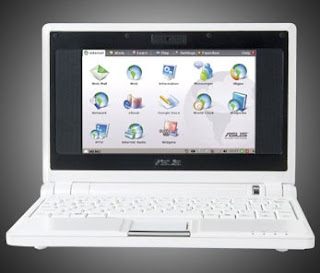
With the Eee PC Asus is now leading the pack in the marketing of small notebooks. These computers have been dubbed ‘netbooks‘ as their primary focus is on wireless connection to the Internet, web browsing, and email.
One interesting outgrowth of this new trend in Internet-centric computers is the adoption of Linux as a viable, even preferable, alternative to Windows. To date Asus has sold over one million units, and has projected that over five million will sell before the end of the year. For Linux this is a huge increase in user adoption. Given the success of Linux on these machines it’s easy to speculate that users of Windows might start to question why they need the more expensive OS from Microsoft. That said, Asus is now releasing a version of the Eee PC that uses Windows XP, and HP is marketing their own netbook with Windows Vista.
Clearly a demand has been created for ultra-portable computers with advanced wi-fi capability. So, what could this mean for desktop applications? It could mean that client-side software comes under attack by software in the cloud, or hosted applications. The nature of the netbooks makes them an ideal platform for writing, storing, and sharing all of your documents online with services such as Google Apps or Zoho Office.
Obviously, these are not ideal systems for high-end graphics work or gaming. More typical high-end notebooks and desktops will still be used for those purposes. The low cost and small size of these computers make them ideal for students who need a computer for taking notes during class. Writers and Business professionals who are rarely in the office or at home might also appreciate the low cost and flexibility of a netbook.


